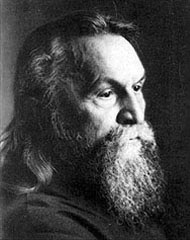 Christian humanism, which presumes the development of all creative capabilities of man, may be understood as a new comprehension, a new revelation, of Christianity. It is no new Christianity, it is only its new comprehension. The various dogmatic definitions given by the Church from time to time have been new comprehensions of the same Christianity. They were accepted as true answers to question raised by the leaders of heresy. For instance, Arianism was such a question, and the Nicene Creed was the answer of the Church. And now, false, atheistic humanism is a question put to the Church, and Christian humanism would be an answer. The leading idea of this creative apprehension of Christianity is that there there exists in history, to use the expression of the Russian philosopher Fedorov, a “common work” for human brotherhood. This common work or task has no exterior limits, it embraces the whole world, it involves the overcoming of the blind forces of nature and the accommodation of them to human will and tasks as well as the appeasing of social elementary forces. Social life is to be organized according to the postulates of Christian love, so also the whole of political life. At present we have not only the separation of the Church from the State — which means the freedom of the Church and is even favorable for her life — but the general secularization of life, its paganization. To meet this situation we must seek for a state of things in which the Church may penetrate as with inward power the whole of human life. The separation of the Church from life must at last be overcome, and all sides of the natural existence of men — certainly all except sin- are to be included in the grace-abounding life of the Church. This postulate of social Christianity or of Christian humanism is a new dogmatic generalization or a new explanation of the incarnation. It is the general principle of the social philosophy which must be developed and applied to different sides of life.
Christian humanism, which presumes the development of all creative capabilities of man, may be understood as a new comprehension, a new revelation, of Christianity. It is no new Christianity, it is only its new comprehension. The various dogmatic definitions given by the Church from time to time have been new comprehensions of the same Christianity. They were accepted as true answers to question raised by the leaders of heresy. For instance, Arianism was such a question, and the Nicene Creed was the answer of the Church. And now, false, atheistic humanism is a question put to the Church, and Christian humanism would be an answer. The leading idea of this creative apprehension of Christianity is that there there exists in history, to use the expression of the Russian philosopher Fedorov, a “common work” for human brotherhood. This common work or task has no exterior limits, it embraces the whole world, it involves the overcoming of the blind forces of nature and the accommodation of them to human will and tasks as well as the appeasing of social elementary forces. Social life is to be organized according to the postulates of Christian love, so also the whole of political life. At present we have not only the separation of the Church from the State — which means the freedom of the Church and is even favorable for her life — but the general secularization of life, its paganization. To meet this situation we must seek for a state of things in which the Church may penetrate as with inward power the whole of human life. The separation of the Church from life must at last be overcome, and all sides of the natural existence of men — certainly all except sin- are to be included in the grace-abounding life of the Church. This postulate of social Christianity or of Christian humanism is a new dogmatic generalization or a new explanation of the incarnation. It is the general principle of the social philosophy which must be developed and applied to different sides of life.
–Sergius Bulgakov, “Social Teaching in Modern Russian Orthodox Theology,” pages 3-25 in Orthodoxy and Modern Society, ed. Robert Bird (New Haven, Connecticut: The Variable Press, 1995), 19-20.










